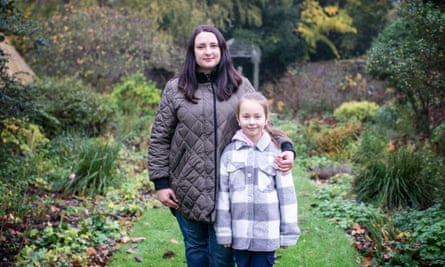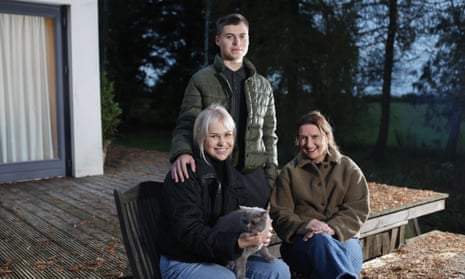Most evenings, while Katya Zaikhchuk was waiting in Poland for the Home Office to grant her and her 15-year-old son, Sasha, a visa to come to England, she would get a video call from her host, Clare Birkbeck, as she cooked supper at home in Essex. “I’d walk around the house, showing her the kitchen and the bedrooms, trying to make her feel comfortable, showing her what living in our house would be like. I was more worried for them than nervous for us,” Birkbeck remembers.
She and her husband bought a Ukrainian flag from Amazon, and their daughter made a poster decorated with yellow and blue curled ribbons and carefully transcribed a welcome message from Google Translate, which they took to the airport when they went to meet their guests in April. “You could see they were both very nervous. When they saw us, they hugged us and cried.”
Birkbeck, a landscape architect, and her husband deliberated for only a couple of days in early March before resolving to host Ukrainian refugees. There was a community of people in and around the Essex town of Saffron Walden who were coming together to offer rooms, and it felt as though there would be a lot of support for both the hosts and the guests.
“It felt very easy to decide. People were in awful situations,” she says. They had the space: three of their four children had left home – two were at university and the third was working in London. “So far it has been a very positive experience. We’ve been really lucky because we’ve got on so well.” But eight months on, Birkbeck and her Ukrainian guests are beginning to think longer term, and realising that an agreement that they envisaged lasting at most a year may be challenging to move on from.

There is much to celebrate about the Homes for Ukraine scheme, which was set up very rapidly in the weeks that followed the Russian invasion, but the next few months will test whether it can survive as a model.
More than 104,100 Ukrainians have arrived in the UK under the sponsorship scheme, while another 40,000 came to stay with relatives. “We have never done anything on this scale. The Kindertransport brought around 10,000 children here in 1939. This is 144,000 people in just over six months – it’s unbelievable,” says Krish Kandiah, who this year launched the Sanctuary Foundation, which became one of the matching organisations helping hosts to find refugees in need of homes. “This is a global gamechanger in terms of refugee sponsorship schemes.”

Many of those who signed up to the scheme in Saffron Walden feel very glad to have been involved, but they also say they may need more support if they are to continue hosting. At the moment the government pays them a “thank you” payment of £350 a month, regardless of the number of people they host. “It’s awkward to moan about it, but it feels like we’re a bargain,” says one host, who has given rooms to four people and is conscious of rising bills.
When the scheme was launched in March, hosts were asked to make a commitment for a minimum of six months. That period has expired for those who were quickly granted visas in March and April, and while most hosts are happy to extend the invitation for another six months or a year, some are beginning to feel uneasy about an emergency arrangement becoming permanent.
Records for the district council of Uttlesford, the rural Essex area that includes Saffron Walden, show that in September, 126 hosts were looking after 198 people from Ukraine, with 25 host families in the medieval town itself. Local primary and secondary schools have been welcoming to children, offering places quickly and giving out vouchers for shoes and free uniforms. Volunteers have helped out by donating clothes, free ballet lessons for children, organising English classes and putting on welcome picnics.
When the end of the initial period approached, Uttlesford council wrote to hosts asking if they wanted to extend the agreement for another six months. So far, 18 households have told the council they need help to find somewhere new for the refugees they are hosting. Nationally, 2,175 Ukrainian households have had had to register as homeless (about a half of these of had been living with Homes for Ukraine hosts).
“The main problem is that there’s nowhere else for them to go,” said one host (asking not to be named, to avoid upsetting the people living with her). “There is no exit strategy and that feels difficult for all of us. We all plunged in without knowing how it was going to pan out and our lives quickly became emotionally entangled.”
While in theory Ukrainians can claim housing benefit and rent their own places, most were invited to stay in relatively well-off areas where households have the time, money and space to devote to hosting refugees, but which are difficult places in which to find affordable housing to rent. One host worries that a refugee in the town is jumping prematurely into a relationship with a man she hardly knows in order to secure somewhere to live longer-term. “You see people making very stark choices,” she says.
In September, Uttlesford council held a meeting for hosts and guests to set out their options if they wanted to move on; about 70 people turned up for what turned out to be a bleak evening. Council officials made it clear there was almost no social housing available locally, and renting privately would be difficult too because of high rents; they set out how Ukrainians who wanted or needed to move might have better options in cities such as Peterborough or Colchester where rents are lower. “It was a hard message and people were freaked out,” says a host who attended the meeting.
“They said you need to have £50,000 income if you want to rent here. I cried afterwards. I’ve got a job here, my son’s in school here,” says Zaikhchuk.
“You’ve had one big upheaval and you don’t want another,” says Birkbeck, but they both know the current situation is probably not sustainable. A few months after Katya and Sasha arrived, her mother followed (bringing the family cat). Her mother is being hosted by nearby family, but owing to that host’s illness she must find somewhere new to live by December, and ideally they would all like to live together.

“She has one month to find somewhere. It’s really tough,” says Katya Zaikhchuk.
“Katya wants to live her own life, and my children would quite like to be able to visit home again. It hasn’t been very easy for them,” says Birkbeck. They have searched property websites, but found that landlords want tenants with a good credit rating and are nervous about renting to people from Ukraine.
Hosts here point to schemes launched elsewhere: in Bristol, a rent guarantee has been offered to Ukrainians, and a £1,000 thank-you payment promised to landlords; in Wiltshire, the council will put down a deposit and a month’s rent on behalf of Ukrainian refugees. Why, they ask, isn’t a similar approach being rolled out nationally?
Everyone finds the question of what comes next an uncomfortable subject to broach. “I don’t want to ask directly what their plans are. It’s a very delicate issue to talk about,” says another host from Saffron Walden.
She remains broadly positive about the experience, but is honest about how completely it has overwhelmed her life. “It feels like we’re involved in a huge experiment. It’s like we’re walking across a cartoon bridge which is being built ahead of us as we go along. Everyone is making everything up all the time.”
Her neighbour, who is hosting a Ukrainian grandmother, acknowledges that most of the hosts didn’t allow themselves much time to decide. “I knew other people who were doing it – it was a bit: ‘If you’re in, I’m in,’” she says. A local piano teacher, who is originally from Ukraine, put several people in touch with people she knew needed help. “It was impulsive and at that time there was a feeling that this would be done and dusted within a few months. If I’d thought too hard about all the reasons not to do it, I wouldn’t have done it. It was reckless, but my guest has been a delight and so far it has worked well.”
The government created the Home for Ukraine scheme partly in recognition of the fact that its recent Afghan refugee resettlement programme was a disaster. Long-term housing had still not been found for those airlifted out of Kabul and £1.2m a day was being spent on housing thousands of people in hotels. (The cost of hotel bills for all asylum seekers is now running at £7m a day.) There was a desire to find a solution by getting volunteers to step up.
“Never again will we have people arrive in the UK and go into hotels without a plan, as happened with those coming from Afghanistan,” said Lord Harrington, the former refugees minister, in September.
after newsletter promotion
Newspapers have printed the occasional dramatic story of hosting arrangements going wrong – marriages breaking down when the British husband falls in love with the Ukrainian guest, cruel hosts ordering refugees to leave immediately. In Saffron Walden, the strains have been more mundane: friction over the unexpected shock of gas bills when soaring energy prices (triggered by the same conflict that created more than 7 million refugees) coincided with the extra cost of more people in the house having long showers.
Both guests and hosts have been startled by cultural differences. Much of this is trivial – surprise from the hosts at the guests’ desire to eat borscht for breakfast and dismay from the Ukrainians at the coldness of English houses, and the suggestion that they put on an extra jumper or fill a hot water bottle rather than turning up the heating (unusual advice for people used to living in Soviet-built blocks with centrally controlled, generous heating). Some Ukrainians are disturbed by the warm November weather, unimpressed by meals of vegetarian pasta and say they find the taste of the water in England different (not in a good way).
Some English hosts have been disconcerted to find striking differences in what is considered polite behaviour. “They think we are crazily polite and they laugh about it sometimes,” one host says. Another asked a teenage boy to help with the cooking, and was told: “It’s women’s work. At home women look after men. When I’m older my wife will cook for me.”
Most Ukrainian parents with school-age children are surprised at British schools’ focus on wellbeing and at the leisurely pace of teaching maths and science compared with the pressure put on children in Ukraine. “The school is really friendly, but the levels in maths are lower,” says Hanna Sukhanova, who is staying in Saffron Walden with her eight-year-old daughter, Taya. “In Ukraine, she was doing homework until 11 o’clock at night. Here she doesn’t have any homework. She’s happy – I’m worried.”
Sukhanova, an accountant, speaks good English and recently started work with a local firm. She hopes to take the British accountancy exams and to be able to rent a home. “I have a job here, my daughter is at school. I don’t want to move.”
Some other Ukrainian guests have also found work (nationally, about 56% of those who arrived earlier this year are now working), but many have been obliged to take jobs below their professional qualifications, in order to start earning money and improve their English. Zaikhchuk, who was an accountant with a railway company at home in Poltava, in central Ukraine, has a job in a cafe. “I’m more used to working with spreadsheets. This is not my career, so it’s hard. Now I’m very good at talking about bread,” she says.
More unexpected for hosts than the costs and the cultural differences is the all-consuming sensation of absorbing some of the stress of people traumatised by war. Recent refugee programmes for those leaving Afghanistan and Syria have aimed to permanently resettle people here, but Ukrainians have been given three-year visas and expect to return home, which makes decisions very difficult.
“No one is in a position to know what is going to happen with the war. Living without certainty is hard and you become caught up in the uncertainty of their lives,” says one host. “That definitely has an impact on you as a host. You feel a huge sense of responsibility for other people’s lives without really being able to help them.”
Sukhanova is enormously relieved to have been able to create a sense of temporary calm in this quiet, pretty market town for herself and her daughter, but she recognises that it is a fragile stability, disturbed every time she looks at her phone. She is still getting air-raid alerts for her home town, so she can track the daily dangers faced by her parents and 19-year-old son. “I have to know what’s happening there – I don’t want to switch it off.”

Nicola McCahill, who is looking after two boys, Zhenya, 17, and Sergiy, 18, knew she was making a longer-term commitment because she realised the adolescents would need the option of staying at her village home, a 15-minute drive from Saffron Walden, for at least two years.
Sergiy was sent by his mother when she discovered that he planned to start military training. “She told me to leave. It was a smart decision. Now that I’m here, I don’t want to be fighting,” he says. He is trying to combine continuing the law degree he started in Ukraine with A-levels in maths, Russian and business studies. “I’m studying all the time,” he says. Zhenya hopes to apply for a computer science degree. Both have had very positive half-term reports from the school.
They have pulled through the first difficult weeks of extreme homesickness and are starting to make new friends but, inevitably, thinking about their Ukrainian school mates makes them depressed. “Eighty per cent of them have left,” says Sergiy. Zhenya opens Snapchat on his phone, which shows the faces of his friends dotted across Europe. “Most of them are in Poland or the Czech Republic. Two are in UK, five are in Germany, one in Kazakhstan, in America and Ireland.”
“I’m glad that my friends are in a safe place, but most of them will never go back. We’re seeing a better life now we’re away from Ukraine,” says Sergiy.
Like most of the other hosts, McCahill has spent a huge amount of time helping her guests to settle in – organising school places, discussing A-level choices and university applications, and registering them with a GP, a dentist and social services. She has helped with the time-consuming administration involved in recording the existence of new arrivals in Britain’s many bureaucratic databases, and tried to console one of them when friends in Ukraine were killed in the fighting. But she shrugs it off as nothing.
“It’s hard to say why it’s been good without sounding bonkers. People in Ukraine are fighting for a wider set of people than their own – it’s the least we can do to support these boys and make them feel welcome,” she says, adding that she is anxious not to sound sanctimonious. “I think a lot of people roll their eyes a bit at the idea of do-gooding meddling, but it just felt like the obvious thing to do. It’s hard giving up your personal space. Even if our best friends in the world had come to live with us it would have been hard at times. They have slotted into our family quite well. The main thing is that they are here, not fighting.”
Most hosts seem reluctant to acknowledge that they have done something good. “It’s made me very unromantic about the notion of refugees. They are just normal people with different motivations about coming here – not everyone was fleeing immediate attack. You are constantly asking yourself, have you really made things better by helping them come?” says one host. “Your job is just to give them space and maybe a springboard to the next thing, and try not to judge them – although sometimes you do.”
The sense that hosts might have done something palpably positive is not something anyone wants to dwell on. “Occasionally,” she adds, “when I see the two girls jumping on the trampoline and playing in the garden with our dogs, I feel glad they are here and not in Ukraine. Nothing matters more than that.”
